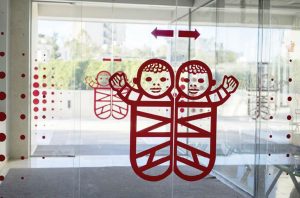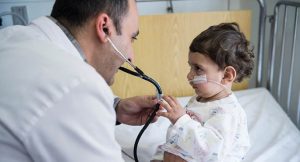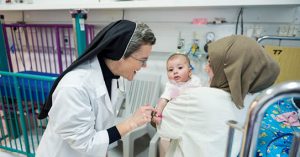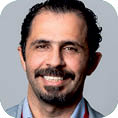It is no surprise, for those who know us well, that Caritas Baby Hospital (CBH) was awarded the third level of the Patient Safety Friendly Hospital Initiative earlier this year. The World Health Organization (WHO) launched this initiative for the Eastern Mediterranean Region in 2008. In the occupied Palestinian territory (oPt), WHO partnered with the Ministry of Health (MoH) and launched the initiative in order to promote a culture of patient safety among health care providers, especially in hospitals, and ultimately to enhance the quality of care. CBH is currently the only hospital in the oPt that has been awarded this level. According to Minister of Health Dr. Jawwad Awwad: “This is a national and regional achievement that we’re all proud of.”

Patient safety is not only an ethical obligation, it is also an integral part of our daily work and culture. Since the beginning, CBH staff and leadership have promised that CBH will remain a pioneer in pediatric medicine in the region.
Historical background
Our story started in 1952 when Father Ernst Schnydrig, a Swiss priest, decided to visit Bethlehem to observe the post-Nakba living circumstances. He was distressed to see children die due to minor illnesses, such as malnutrition and dehydration. Along with a Palestinian physician from Bethlehem, Dr. Antoine Dabdoub, and a Swiss nurse named Hedwig Vetter, who had been serving in Bethlehem since 1946, Father Schnydrig decided to start Caritas Baby Hospital in 1953. The hospital was established as a small pediatric health center with seven beds. Today CBH is an 82-bed facility, including nine beds in the Intensive Care Unit.
Since 1963, Caritas Baby Hospital has been operated by Children’s Relief Bethlehem (CRB), a Christian relief agency based in Lucerne, Switzerland.

Holistic treatment
Despite the changes in pediatric medical needs since its inception, CBH has remained relevant in terms of the health care services it provides to the Palestinian pediatric population. CBH offers first-class treatment for the most common pediatric diseases, such as infections, gastroenteritis, respiratory illnesses, and diseases of the central nervous system. Cases of sepsis and jaundice in newborns are frequently treated too.
The hospital also receives patients with hereditary diseases, such as cystic fibrosis and metabolic disorders. These diseases are common in Palestine due to the high rate of marriage between close relatives. Such cases are complicated, challenging, and resource consuming for any health care system. Normally, these diseases are incurable. Therefore, CBH manages hereditary diseases through community awareness, early diagnosis, and management of symptoms, thus contributing to reducing disease prevalence, preventing long-term harm, and improving the overall quality of life for our sick children.
In the current strategic plan (2018–2023), the hospital is prioritizing the pediatric subspecialties of neurology, pulmonology, and pediatric intensive care. This is in response to the rising demand for these subspecialties in the oPt as indicated by a needs-assessment study conducted by our team in 2016.
At CBH, emphasis is placed equally on social and psychological support. The Department of Social Services offers consultancy for both mothers and children. Mothers are also encouraged to stay in the Mothers’ Residency Department to remain close to their hospitalized children. This is important for the child and for the mother who is being empowered and educated during her stay.

CBH is an integral part of the Palestinian health care system
Founded as an act of humanity, CBH is currently the sole exclusively pediatric hospital in the oPt. In 2018, CBH provided nearly 53,000 treatments for sick children who came mainly from the governorates of Bethlehem and Hebron. We are proud to be an active member in the Palestinian health care system through our partnership with the MoH and other stakeholders.
The hospital is accredited by the Palestinian Medical Council as a teaching hospital. Physicians specializing in pediatrics can serve at CBH for two and a half years out of their four-year residency program. We also collaborate with the local universities to provide hands-on
training for their nursing and other paramedical students. On an organizational level, CBH employs 250 people, 65 percent of whom are female.
Father Schnydrig founded this hospital based on the grounding principle of serving every child in need, regardless of social, religious, or financial background. Today, his legacy continues to inspire us and guide our work. Yet, the hospital is facing the challenge of sustaining a balance between its mission and its role as a health care provider within the Palestinian health care system. Safeguarding the future of the hospital helps to ensure a healthier next generation. This is indeed a noble commitment and in fact a duty that can only be realized through partnership and broad cooperation.
For further information or to book a visit or make a donation, please contact us at pr@crb-mail.org


